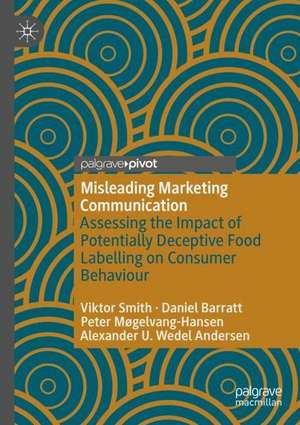Misleading Marketing Communication: Assessing the Impact of Potentially Deceptive Food Labelling on Consumer Behaviour
Autor Viktor Smith, Daniel Barratt, Peter Møgelvang-Hansen, Alexander U. Wedel Andersenen Limba Engleză Hardback – 11 oct 2022
By first critically reviewing the legal conception of misleading commercial practices manifest in EU law, the authors discuss whether and how it can be transposed into empirically measurable terms. Presenting four complementary experimental studies targeting recurrent grey-zone scenarios on the Danish food market, the book illustrates the potential of the so-called ShopTrip test paradigm which simulates and registers real-life e-shopping behaviour as it unfolds while yielding new types of data against which opposing assessments of potential misleadingness can be matched. The results are discussed in the light of possible paths of theoretical explanation and implications for future regulative practices, including companies’ self-regulation.
Preț: 352.98 lei
Nou
Puncte Express: 529
Preț estimativ în valută:
67.54€ • 72.23$ • 56.32£
67.54€ • 72.23$ • 56.32£
Carte tipărită la comandă
Livrare economică 17 aprilie-01 mai
Preluare comenzi: 021 569.72.76
Specificații
ISBN-13: 9783031112058
ISBN-10: 3031112059
Pagini: 164
Ilustrații: XV, 164 p. 38 illus.
Dimensiuni: 148 x 210 mm
Greutate: 0.37 kg
Ediția:1st ed. 2022
Editura: Springer International Publishing
Colecția Palgrave Macmillan
Locul publicării:Cham, Switzerland
ISBN-10: 3031112059
Pagini: 164
Ilustrații: XV, 164 p. 38 illus.
Dimensiuni: 148 x 210 mm
Greutate: 0.37 kg
Ediția:1st ed. 2022
Editura: Springer International Publishing
Colecția Palgrave Macmillan
Locul publicării:Cham, Switzerland
Cuprins
Part I: Background.- Chapter 1: Setting the scene- Chapter 2: he legal conception of misleading product labelling and its operationalization- Chapter 3: Measuring misleadingness: The preference-conscious choice modelled and observed- Part II: Studies- Chapter 4: Study 1: Low-fat claims on real-market products.- Chapter 5: Study 2: Low-fat claims on fictitious products.- Chapter 6: Study 3: What’s behind the keyhole.- Chapter 7: Study 4: ”Local” by facts or by atmosphere?- Part III: General discussion.- Chapter 8: Why do consumers get it wrong?- Chapter 9: Implications for fair labelling practices: How to get it right.- Chapter 10: Concluding remarks.
Notă biografică
Viktor Smith is an Associate Professor at the Department of Management, Society, and Communication, Copenhagen Business School. He has headed and participated in a number of collaborative research projects and is currently leader of the cross-departmental research group FairSpeak at Copenhagen Business School. His key research interests include naming & framing, multimodal communication, and the border-zone between persuasion and communicative fairness.
Daniel Barratt is an Associate Professor at the Department of Management, Society, and Communication, Copenhagen Business School. He is the director of CogLab, a facility for conducting experimental perceptual and cognitive research based at the same department. He has a background in the fields of film, philosophy, and cognitive science.
Peter Møgelvang-Hansen is Full Professor Emeritus at CBS LAW, Copenhagen Business School. His key research interests are business law, marketinglaw, consumer law, and enforcement. He is the author and co-author of an extensive number of textbooks. academic papers, reports, and white books. He has been a member of a wide range of councils, boards, and commissions. Furthermore, he has been functioning as an expert judge at the Danish Maritime and Commercial Court and a member of the Commission for Marketing and Advertising of ICC Denmark.
Alexander U. Wedel Andersen has a Master’s Degree in Intercultural Market Studies from Copenhagen Business School (2019). He has contributed to the work presented in the present book as part of his Master Thesis project and as a Student and Graduate Research Assistant at the Department of Management, Society, and Communication, Copenhagen Business School (2019-2020). He is now working as a Search Engine Marketing Specialist at Bigum&Co.
Daniel Barratt is an Associate Professor at the Department of Management, Society, and Communication, Copenhagen Business School. He is the director of CogLab, a facility for conducting experimental perceptual and cognitive research based at the same department. He has a background in the fields of film, philosophy, and cognitive science.
Peter Møgelvang-Hansen is Full Professor Emeritus at CBS LAW, Copenhagen Business School. His key research interests are business law, marketinglaw, consumer law, and enforcement. He is the author and co-author of an extensive number of textbooks. academic papers, reports, and white books. He has been a member of a wide range of councils, boards, and commissions. Furthermore, he has been functioning as an expert judge at the Danish Maritime and Commercial Court and a member of the Commission for Marketing and Advertising of ICC Denmark.
Alexander U. Wedel Andersen has a Master’s Degree in Intercultural Market Studies from Copenhagen Business School (2019). He has contributed to the work presented in the present book as part of his Master Thesis project and as a Student and Graduate Research Assistant at the Department of Management, Society, and Communication, Copenhagen Business School (2019-2020). He is now working as a Search Engine Marketing Specialist at Bigum&Co.
Textul de pe ultima copertă
Using the case of food labelling, this book demonstrates that the line between fair and potentially misleading communication can be approached in empirical terms, supplementing the predominantly political and legal deliberations that determine how society deals with these issues.
By first critically reviewing the legal conception of misleading commercial practices manifest in EU law, the authors discuss whether and how it can be transposed into empirically measurable terms. Presenting four complementary experimental studies targeting recurrent grey-zone scenarios on the Danish food market, the book illustrates the potential of the so-called ShopTrip test paradigm which simulates and registers real-life e-shopping behaviour as it unfolds while yielding new types of data against which opposing assessments of potential misleadingness can be matched. The results are discussed in the light of possible paths of theoretical explanation and implications for future regulative practices, including companies’ self-regulation.
Caracteristici
Establishes a common ground for dealing with potentially misleading business-to-consumer communication Highlights a number of current and future challenges to communicative fairness in physical stores and in e-commerce Explores ways of meeting such challenges while aligning the interest of companies, consumers, and society at large
